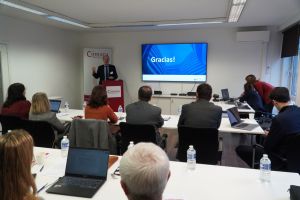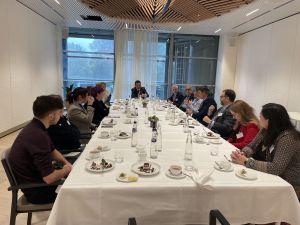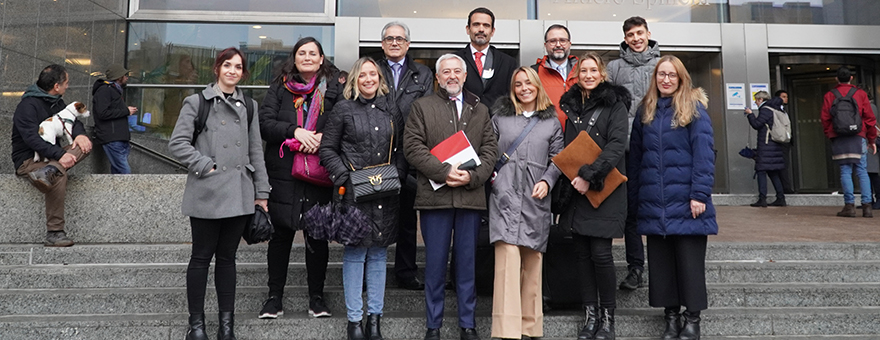Fifth edition of the training on “Public advice strategies and dialogue with European institutions” held
On November 15th and 16th, the Official Spanish Chamber of Commerce in Belgium and Luxembourg organised in Brussels the fifth edition of the training course “Public advice strategies and dialogue with European institutions”, aimed at Spanish companies and associations.
More than a dozen representatives of national companies and sectoral associations took part in the training, interested in learning first-hand about the tools to establish an effective dialogue with the EU authorities, and motivated to anticipate both the opportunities and risks arising from the political and legislative action that takes place in Brussels.
The training, held in a hybrid format for the second time, was given by renowned professionals from multinationals, business organisations, leading Spanish organisations and European civil servants.
 The first day began with an introduction by Pablo López-Álvarez, President of the Chamber and Senior Managing Director of FTI Consulting, in which he presented a global vision on lobbying and the monitoring of European action. Then, the senior expert of the European Commission, Miguel Ceballos Barón, spoke about the institutional structure of the EU and its adjacent ecosystem.
The first day began with an introduction by Pablo López-Álvarez, President of the Chamber and Senior Managing Director of FTI Consulting, in which he presented a global vision on lobbying and the monitoring of European action. Then, the senior expert of the European Commission, Miguel Ceballos Barón, spoke about the institutional structure of the EU and its adjacent ecosystem.
Subsequently, Susana Garayoa, Head of European Institutional Relations at Zabala Innovation, presented the financing opportunities for companies together with Amir Campos Reviriego, senior consultant at Schuman Associates, who spoke about recovery funds.
Closing the morning of the first day was Carlos Rodríguez Cocina, Director of Telefónica’s Brussels office and Head of European Affairs at Telefónica, who spoke about the role of the Public Affairs Director.
In the afternoon, Sonia Vila, Head of the Management and Resources Unit of the Presidential Service I.D.E.A. – Inspire, Debate, Engage and Accelerate Action of the European Commission and former member of President Von der Leyen’s cabinet, explained the EU’s sphere of competence and its priorities.
Sebastián Rodríguez, Managing Director of Rollout Democracy, then presented a manual for advocacy campaigns and European public affairs through case studies.
The first day was rounded off by Juan Alfonso Herrero Pascual, Director of European Affairs at Mercadona, who gave a presentation on the transparency register, and Raquel García, a researcher at the Elcano Royal Institute’s office in Brussels, who spoke about the projects that this organisation develops from “the capital” and the role played by Think Tanks within the Brussels ecosystem of influence.
Visits to the institutions
After the presentations of the day, the Chamber organised a networking cocktail with Spanish professionals and European officials, in which the attendees to the training, several members of our Board of Directors, several advisors of the PERMREP of Spain to the EU and delegates of Autonomous Communities participated.
On the day of November 16th, the training began with a visit to the Permanent Representation of Spain to the EU, where Begoña Montoro, Economic and Commercial Counsellor, received the Spanish companies and associations to talk to them about the functioning of the European institutions and the role of PERMREP in the context of the Spanish Presidency of the Council of the Union.
Back at the Chamber’s premises, the training continued with a presentation by Ignacio Sánchez-Recarte, secretary-general of the European Committee of Wine Companies (CEEV), who explained the role of business associations and sectoral employers’ associations and their function in the European legislative process.
The day continued with a visit to the European Parliament and a lunch with MEPs, which was attended by Eider Gardiazabal Rubial,  Nicolás González Casares, Jonás Fernández and Inma Rodríguez-Piñero, members of the Group of the Progressive Alliance of Socialists and Democrats. During the meeting, the MEPs explained the work they do in the Parliament and the importance of ensuring that the interests of European companies reach Brussels. The lunch was also an opportunity for those attending to present and resolve their doubts about the dialogue between the organisations and the MEPs.
Nicolás González Casares, Jonás Fernández and Inma Rodríguez-Piñero, members of the Group of the Progressive Alliance of Socialists and Democrats. During the meeting, the MEPs explained the work they do in the Parliament and the importance of ensuring that the interests of European companies reach Brussels. The lunch was also an opportunity for those attending to present and resolve their doubts about the dialogue between the organisations and the MEPs.
The last training activity took place at the Council of the European Union, which the attendees were able to visit together with Isabel Riaño, Director General of Competitiveness and Trade of the institution.
The training was closed by Sara Sánchez, commercial delegate of the Chamber, who took the opportunity to explain the services and the role played by the Official Spanish Chamber of Commerce in Belgium and Luxembourg as a support entity for Spanish companies interested in defending their interests in the European Union.






